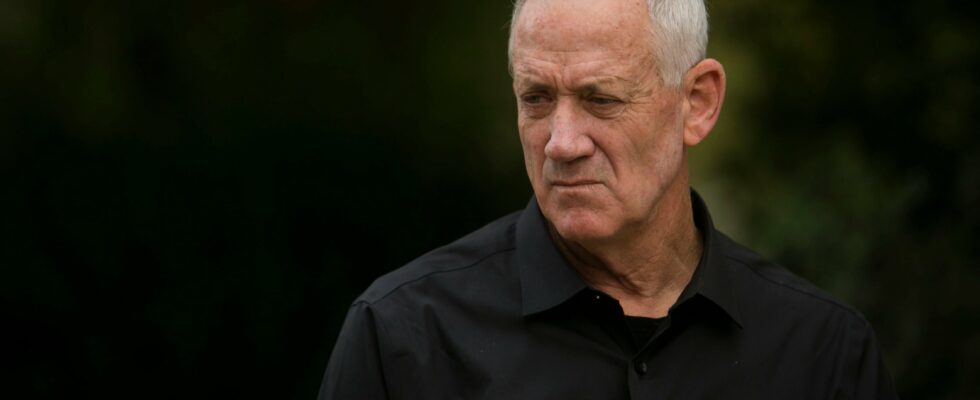Violent fighting pitted Israeli troops against Palestinian fighters on Saturday, May 18, in Jabalia, in the north of the Gaza Strip, and Rafah, in the south. In the eighth month of the war against Hamas, dissensions are widening at the top of the Israeli state.
Information to remember
⇒ Benny Gantz, member of Israeli war cabinet, threatens to resign
⇒ Fighting between the IDF and terrorist groups in Rafah
⇒ An American envoy visits Israel this Sunday
Dissensions in the Israeli war cabinet
Benny Gantz, member of the war cabinet, threatened to resign if a strategic “action plan”, particularly for the post-war in Gaza, was not adopted within three weeks. Before him, on May 15, Defense Minister Yoav Gallant had already called on Prime Minister Benjamin Netanyahu to “immediately prepare” a “governmental alternative to Hamas” in Gaza.
Benjamin Netanyahu, who has so far refused “any discussion” on the future before “Hamas is wiped out”, accused Benny Gantz, a political rival of the center-right, of risking “the defeat of Israel “, and of wanting to “overthrow the government”.
Fighting between IDF and terrorist groups in Rafah
On the ground, the Israeli army claimed on Saturday to have “eliminated around fifty terrorists” in the east of Rafah, the southern Gazan city adjoining Egypt, where its troops entered on May 7. According to AFP journalists, artillery fire and airstrikes continue in the east and northeast of Rafah. The al-Quds Brigades, the armed wing of the Palestinian Islamic Jihad, also claimed to be confronting Israeli troops in the east of the city.
Since Israel ordered the evacuation of the eastern sectors of Rafah on May 6, “800,000” people have “been forced to flee”, piling up in particular in Khan Younès, further north, indicated on X Philippe Lazzarini, head of UNRWA, the UN agency for Palestinian refugees.
Evacuation orders in Jabalia
In the north of the Gaza Strip, the army ordered in the evening the “immediate” evacuation of western neighborhoods of the town of Jabalia, from where it said rockets had been fired at Israeli towns. At the beginning of January, Israel announced that it had neutralized Hamas in the north of the Palestinian territory, but according to the army, the movement – considered a terrorist organization by Israel, the United States and the EU – “totally controlled” Jabalia. a few days ago.”
Hamas reported “dozens” of deaths and “hundreds of wounded, accusing the Israeli army of targeting “residential buildings” as well as “schools and shelters.” The Al-Quds Brigades claimed to have targeted an Israeli command center in Jabalia, witnesses reported explosions and continuous fighting throughout the night on Sunday.
Refugee camp targeted by airstrike
An Israeli airstrike killed twenty people before dawn this Sunday in a house in the Nusseirat refugee camp, in the center of the Gaza Strip, Al-Aqsa hospital and witnesses reported. The Israeli army said it was verifying these facts. Al-Ahli Arab hospital in Gaza City also reported three people killed and several injured in an Israeli airstrike on a school where displaced people were sheltering in the Al-Daraj neighborhood.
An American envoy to Israel this Sunday
After months of bombings and operations which ravaged the north and center of the Gaza Strip, and pushed hundreds of thousands of displaced people to Rafah, the Israeli army announced on Thursday that it was intensifying its operations in this city, with the objective announced to annihilate the last Hamas battalions there, despite international concerns.
On Friday, 13 countries – Japan, Canada, New Zealand, the United Kingdom, Australia, South Korea and seven EU member states including France – sent a joint appeal to Israel not to launch a military offensive. large scale on Rafah. Israel’s primary supporter, the United States, which also opposes a major offensive in Rafah, announced the visit to Israel this Sunday of the White House national security adviser, Jake Sullivan.
While the delivery of humanitarian aid has been almost at a standstill for days due to the closure of road crossings, “more than 300 pallets” of material were sent for the first time on Saturday via a temporary floating jetty built by the United States, the Israeli army announced on Saturday.
